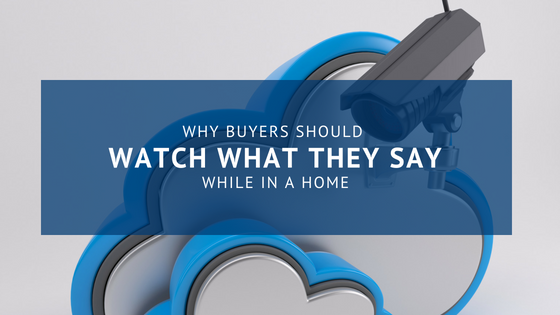
It is a common scene when buying a home – you take the tour with your Realtor, getting a chance to scope out closet sizes, envision how your furniture will look in this room or that room and building a vision board about projects and upgrades you would look to tackle. The seller is traditionally out of the house at this point, so you are a little more free to be candid with your Realtor about the property.
“I absolutely love this place,” you gush, eyes drawn to the elegant crown molding, the spacious Carolina room, or the absolute day spa of the master bath. “I want to put an offer in now before anyone else does, and I’m willing to go above asking price if it comes to a bidding war.”
There was a time when you could feel free to enthuse to your heart’s content while in your possible new dream home, without fear of potentially compromising your negotiations. But as more and more buyers are finding out, just because the seller is not physically present does not mean they cannot hear you.
The rise in smart-home technology has made it easy for virtually anyone to fill their home with overt and covert recording devices. It may not be something the seller necessarily put in for the purposes of listening in on potential buyers. But, when they are looking to sell their home and the smart devices are already in place, it can be hard not to leave them running to learn what potential buyers may think of their home.
That opportunity for a seller to be “virtually” present in the home while you are viewing it exists for many. Speaking to USA Today, Brad Russell, research director for the consumer technology research firm of Parks Associates pointed out that 9.4 million homes are equipped with Wi-Fi enabled cameras and microphones - and 11 million have similar setups on the doorstep or outside the house. That number, he said, is expected to grow to 50 million homes by 2020 as the price of these electronics continues to drop. That is to say nothing of the 56 million smart home hubs already sold, any of which can be listening at any time.
Once those recording devices are in the home, many have a hard time turning them off - especially when leaving them on could possibly help during negotiations of a home sale. A Harris Poll survey conducted for NerdWallet found that 15% of Americans who have sold a home have used their security cameras to snoop on buyers - and 67% said that if those devices were already in the home, they would use them.
Clearly the motive and the means are there. But is it legal? Privacy laws vary from state to state governing covert recordings and South Carolina’s are fairly lenient. The only statute in state law governing surveillance applies more to “peeping Tom” cases than home sales. So it appears to be legal, But, is it ethical? Clearly it presents issues. However, there are many reasons why a seller would have a home security system up and running. If a home has expensive works of art or electronics, sellers may not be comfortable letting strangers in without being able to keep an eye on them. The reality is that the technology is too new to have really generated any hard-and-fast rules.
The lesson is this: when you walk into a seller’s house, there is a strong likelihood that you are being watched, recorded and listened to. So, it is to your advantage to keep your “oohs” and “aahs” to a minimum until you are back in the car.
Posted by Charter One Realty on

Leave A Comment